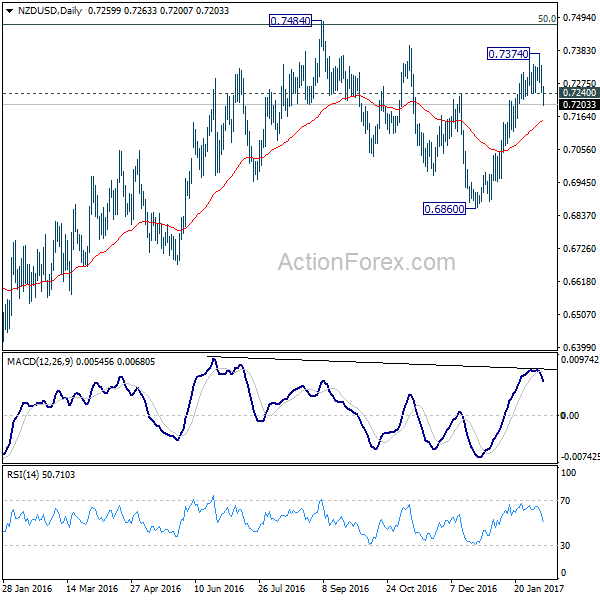New Zealand Dollar weakens after RBNZ left the Official Cash Rate (OCR) unchanged at 1.75%. More importantly, the central bank adopted a more dovish outlook for the OCR. RBNZ now forecast interest rate to stay at around 1.8% through June 2019 and move up to 2.0% in 2020. The markets were nearly pricing in full chance of a rate hike by November this year. But after the release, such pricing dropped to around 50%. Meanwhile, RBNZ trimmed inflation forecast too. Inflation is projected to be at 1.5% this year, soften to 1.3% at the start of 2018 and then climb back to 2% by mid-2019. Technically, NZD/USD dips through 0.7240 support which now indicates near term reversal. Near term outlook in NZD/USD is now turned bearish for 55 day EMA (now at 0.7150).

Australia Business Confidence Firm
From Australia, NAB business confidence dropped slightly to 5 in Q4, down from 6. Current condition index dropped 2 points to 5. Capital expenditure plans dropped to 22, down from 24. NAB noted that "relative stability of business confidence gives us some comfort". However, "some of the trends could suggest a loss of momentum in the longer term, should they continue." Also, there is "little to no sign that inflation or wage pressures are picking up materially."
UK Businesses to Offer Lower Wage Increase
In UK, a BoE survey showed that businesses are prepared to offer less pay rise this year. Companies expected to offer 2.2% increase in wages, slowed from 2.7% in 2016. That is a reaction to rising costs due to Sterling's depreciation since last year's Brexit referendum. BoE also noted that "consumer spending growth had remained resilient, but was expected to ease during the year as prices rose." Wage growth would be a key factor for BoE to determine when to lift interest rate while policies are still tolerant for a spike in headline inflation in near term.
On the data front, New Zealand building consents dropped -7.2% mom in December. Japan M2 rose 4.1% yoy in January while machine orders rose 6.7% mom. UK RICS house price balance rose to 25 in January. Looking ahead, Swiss unemployment rate, German trade balance will be release in European session. Canada will release new housing price index. US will release jobless claims.
